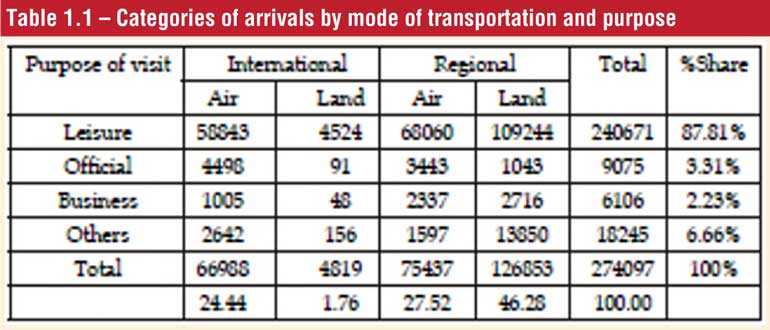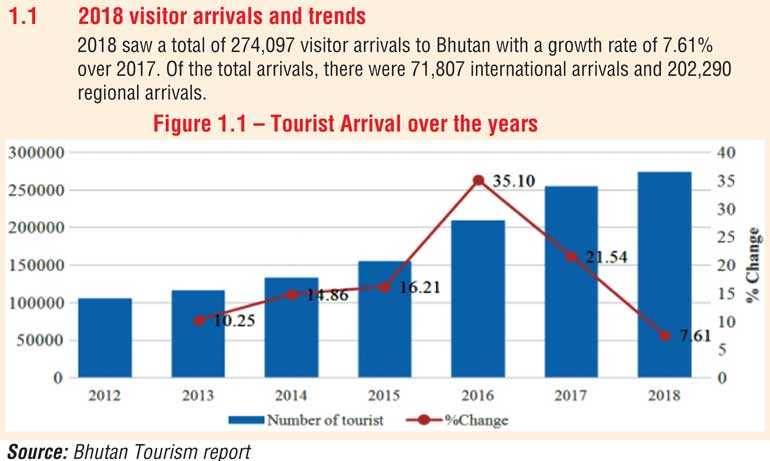Monday Feb 16, 2026
Monday Feb 16, 2026
Wednesday, 1 January 2020 00:00 - - {{hitsCtrl.values.hits}}


The issue of Numbers Vs. Quality is well-addressed in Bhutan’s tourism policy but whether such an unbending approach can be copied by other countries is questionable at a time that all destinations are looking to economic growth with higher per capita income. Nevertheless, it is advisable to study tourism  policies and approaches of other countries to see if there are good practices that can be adapted in Sri Lanka appropriately in the future if not now.
policies and approaches of other countries to see if there are good practices that can be adapted in Sri Lanka appropriately in the future if not now.
In reality most of the tourism policy documents are somewhat similar and these policies are meant to be documented as required by the statute and/or as guidelines underpinning implementation. The extent to which such policies are transferable to operations is crucial and that it is something worth studying in comparative analysis hence this article on Bhutan tourism.
Bhutan as we know, is a small country sandwiched between two giants viz China and India with a gifted location of southern Himalayas which itself is used to strengthen the brand Bhutan. Bhutan is popularly known as ‘Land of Thunder Dragon’. With less than one million people, Bhutanese Government is cautiously optimistic in tourism development with the parameters set for sustainability of tourism resources. Rich in culture and diversity, Bhutan is number one destination, ahead of New Zealand in the concept of eco-tourism.
While their industry advertises locations such as Rinpung Dzong, Chele La Pass, Punakha Dzong, Buddha Dordenma Statue, Dochula Pass, Tiger’s Nest, Phobjikha Valley, the ‘brand Bhutan’ heavily rests on eco-based travel which is essentially nature, local participation, conservation, visitor learning experience and moral imperatives that are emphasised by policy makers. Most importantly Bhutan delivers the brand promise and that makes the destination more attractive to hard eco tourists who do not seek much services and comforts but are willing to pay the price for what Bhutan is offering as responsible tourism.
Tourism is still new to Bhutan with Bhutanese being still very much an agrarian mountain people with one foot planted in their deeply spiritual past hence the necessity for visitors to be sensitive to their culture and traditions. One principle that Bhutan has followed seriously is not to commodify the culture and traditions in a manner where they are merely there for observation and not to specifically project as a tourism attraction.
The tourism policy is well spelt in the speech of former Prime Minister of Bhutan when he says Bhutan isn’t just carbon neutral — it’s carbon negative! This is a huge advantage when the future visitors themselves become responsible tourists where they would look for destinations that are adhering to sustainable principles. They opened the doors to tourists very slowly, relative to other Asian destinations. This has not caused them an issue that they are way behind others. On the contrary, they are learning from the experiences of neighbours viz all SAARC countries which guide them with a cross section of tourism performance.
Bhutan relies on word of mouth by the visitors who were already there. They allow visitors to go through reviews to gauge a clear understanding of the cultural, spiritual and political beliefs of the Bhutanese and how best they could have their holiday while being there.
However, since this year Bhutan has increased tourism promotion with the notion that they need to catch up as one aspect they were harping on is that visitors do not expect to have the conveniences of modern travel. This is where they expect to strike a balance i.e. preferably to raise the bar to around 350,000 tourists by 2022.
The $ 250 daily traveller tariff (reduced to $ 200 in Jan, Feb, Jun, July, Aug and Dec), visitors need to pay which is often referred to as a tax , the entry fee – a minimum amount you will need to spend on your trip to enter Bhutan, including tax, visa, lodging, food, guide and travel within the country. You cannot spend less than that rate.
Through this tax and the fact that most visitors to Bhutan have been for leisure, Bhutan expects to have quality tourists with a low impact. Most visitors prefer to go to unspoilt places. The tourism policy is designed ‘to protect and share the country’s incredible landscape with tourists while keeping it special for the locals too’, a point that supports their pioneering philosophy of ‘Gross National Happiness’ continually ranked as the happiest country in Asia and the eighth-happiest country in the world according to a survey by Business Week.
So there it is! The GNH. Bhutan wants to develop tourism and at the same time maintain their principle of GNH giving priority to wellbeing of the societies and people which is also the cardinal principle of Eco Tourism. $ 65 out of every $ 250 fee of tourism income goes towards funding the free education and healthcare that the Bhutanese government provides for its citizens. Although there is about 30% rural population who live under the poverty line, there are no beggars, slums or homelessness.
Therefore there is a perfect balance between opening up the country to tourism and benefitting their people while protecting their culture and traditions. The Bhutanese are proud of their policy and their guides are not hesitant to announce that the government is taking revenue from tourists and how a certain amount of the tourist tariff goes to education and health.
For instance, the tour operators advise visitors not to give gifts, money, or sweets to the local people on visits to villages as it can encourage ‘begging’. They do not want tourists being seen as simply ‘givers’ giving to ‘the poor’. Instead, they ask tourists to buy local handicrafts directly from villagers and show an interest in their skills.
The buying and selling of tobacco products is banned in Bhutan, though the visitors are allowed to bring in 200 cigarettes for personal consumption for which a 200% import duty is imposed. It is prohibited to smoke in public places an absolute no-no to smoke anywhere near temples or religious sites. The Bhutanese government has launched a ‘Clean Bhutan programme’, to use volunteers to clean up streams, trekking routes, villages and towns.
Bhutan’s tourism sector is regarded as one of the most exclusive travel destinations in the world. Bhutan enjoys a reputation for authenticity, remoteness and a well-protected cultural heritage and natural environment.
Former PM of Bhutan Tshering Tobgay said in his famous speech to a distinguished audience in April 2016, “We are not a developed country, but we are doing okay! In fact we are thriving. We are blessed with extraordinary kings. Our enlightened monarchs have worked tirelessly to develop our country balancing economic growth carefully with social development, environment sustainability and cultural preservation.”
This, in marketing terminology, is the brand promise which Bhutan is striving to deliver and many other neighbours that are ahead of them will have much to learn from Bhutan in the future with regard to Numbers Vs. Quality.
(The writer is a former diplomat, tourism official and currently an academic.)